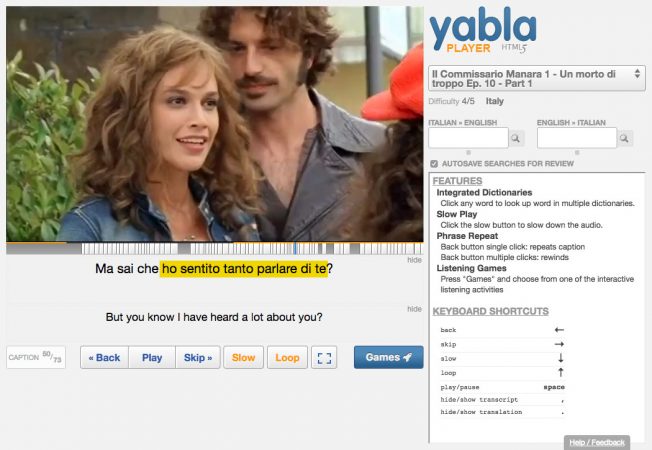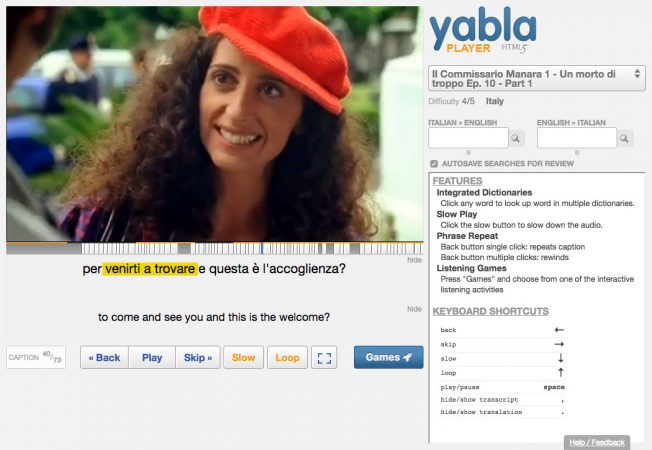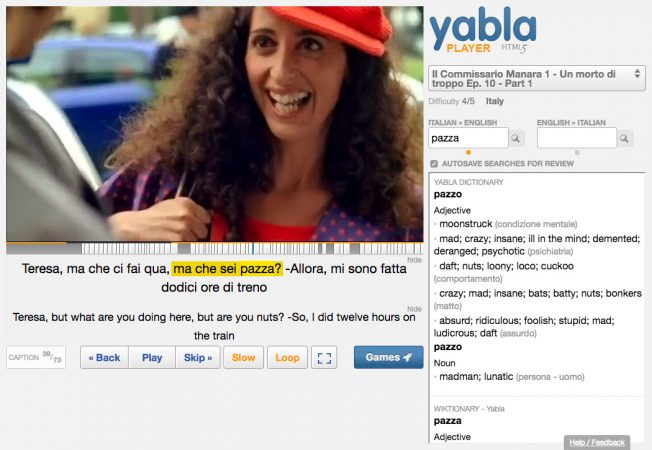Ciao a tutti!
We’re continuing this week with our series of phrases from Il Commissario Manara: Un morto di troppo on Yabla.
Luca’s sister has come to visit him (è venuta a trovare) and now Lara, Luca’s on-again off-again girlfriend and fellow detective has just appeared. When Teresa hears who she is she says:
Ma sai che ho sentito tanto parlare di te!
But you know I have heard so much about you!
More literally this might be:
Ho sentito tanto parlare di te!
I’ve heard so much talk of you!
And if you want to use the formal you:
Ho sentito tanto parlare di Lei!
I’ve heard so much about you!
You can also say:
…di loro
…di lui
…di voi
…del NJILE…
The tricky part comes when you want to drop …di (qualcuno/qualcosa). Here you need to use the infamous ne.
I’m not going to go too deeply into this. I think it’s best just to learn via phrase. However, for those of you struggling to understand the difference between ne and ci, here is a tiny bit of grammar.
Whenever you use the preposition di, you will replace it with ne.
Everything else, mainly a, but also su and in, will be replaced with ci.
So…
Ne ho sentito tanto parlare.
I’ve heard a lot of talk about it.
or what if I haven’t?
Non ne ho mai sentito parlare.
I have never heard of it.
Now for those of you who are more advanced, what about this? Suppose you heard someone else talking about something?
I heard him talking about it.
L‘ho sentito mentre ne parlava.
or more literally:
L‘ho sentito mentre ne parlava.
I heard him while he was talking about it.
Here are some examples from Reverso:
Sa, ho sentito parlare di persone come lei.
You know, I’ve heard of people like you.
Davvero non ne hai mai sentito parlare?
You have really never heard of it?
Probabilmente non ne hai mai sentito parlare.
You have probably never heard of it.
E ho sentito parlare di tutti.
And I’ve heard of everybody.
E poi… ho sentito parlare del Dragone.
And then… I heard about the Dragon.
Stavo giusto dicendo che ho sentito parlare di cibo quadrato.
I was just saying that I’ve heard of a square meal.
Come mai non ne ho sentito parlare dall’altro chirurgo?
How come I’ve never heard of the other surgeon?
Appena ho sentito parlare di quella scialuppa carbonizzata, ho voluto vederla.
As soon as I heard about that charred lifeboat, I wanted to see it.
Del reattore in Cina ne ho sentito parlare, ma dell’aumento dei futures della soia…
The reactor in China, I heard about, but the spike in soy futures…
La sorella di Dave ha sentito lui mentre ne parlava.
Dave’s sister heard him while he was talking about it.
How do you search for examples on Reverso?
You can see my search terms in the above sentences in blue. When you are unsure about how to say something, give it a try. Put your attempt in the search bar and see if you get any exact hits. One hit doesn’t tell you much, but if you get a lot of them, you’re on to something. But don’t stop there. Read the sentences to be sure that what you think you’re saying is actually what you’re saying!
You can also try putting the English phrase into the search bar and see what comes back. You may have to try a few times before you get a phrase that works. If you find Reverso keeps changing your text to something else, it could mean that your attempt is completely wrong, but it doesn’t necessarily mean that. Try adding or removing words from the phrase. Read the sentences and you will get the gist!
How will you use today’s phrase to express YOUR OWN THOUGHTS? The sooner you express your own thoughts, the sooner you will remember the phrase, so give it a try. Have you just been introduced to your daughter’s new boyfriend? Or a new colleague at work?
Ho sentito tanto parlare di Lei!
Or is a friend of yours talking about a new film?
Sì, ho sentito parlare di questo film.
Let us know how you used this phrase on Facebook.
That’s it for this week!
Alla prossima!
Yabla Italian is an excellent tool to help you develop an ear for spoken Italian. (I use Yabla personally to study three different languages.) With Yabla Italian you will have:
- verbatim subtitles in Italian
- access to English subtitles when you need them
- the ability to turn the subtitles off as you improve
- quizzes to gauge how well you’re doing
And… this is especially useful… you can slow the video down! Yes! We all know how fast the Italians talk. You know a lot of the words. If you just had a little more time to process them…. Well, now you do!
If you feel your Italian is good enough to watch without Italian (or English) subtitles, this episode of Il Commissario Manara is also available for free from RAI. You will need to fast forward to exactly 48 minutes for the start of Un morto di troppo.





